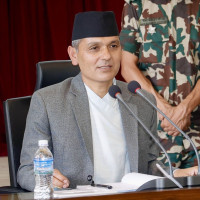- Friday, 20 February 2026
Breaking The Cycle Of Brain Drain
Of all the resources any country is endowed with, human resource is the most important of all. The wealth of any country is simply not dependent on the natural resources it is blessed with, but it’s the human capital who harness the power of these natural resources are the real wealth of any country. Human minds have infinite potential. From the glorious history of humans stepping foot onto the moon more than five decades ago to the possibilities of inhabiting mars in the future, what humanity has achieved and is capable of achieving is beyond measure. No wonder, the countries that bolster and protect their human capital are amongst the most prosperous countries in the world. Research indicates that countries such as Singapore, China, Hong Kong and Japan have consistently protected their population’s education, health, skills, knowledge because of which they are ranked as prosperous countries in the world.
Since these countries offer high income opportunities, brain drain is less of an issue for them. However, brain drain is one of the grave concerns confronting developing economies across the world. Brain Drain is the emigration of skilled and educated professionals from their country of origin to much developed nations in search of better opportunities and better standard of living. According to The International Organization for Migration (IOM), around 3.65 of people globally lived outside their country of birth. Likewise, the recent figures provided by the Department of Immigration indicates that in 2024 alone, a total of 1.674 million Nepalis went abroad, with 66,835 leaving for permanent residence. This problem is showing no signs of slowing down with the number of Nepali going abroad expected to witness a rapid surge in future.
Perils
Nepal is often hailed as one of the most beautiful countries in the world. It is a home to 8 of 14 eight-thousand peaks in the world. The country is blessed abundantly in terms of natural resources and different species of plants and animals. However, it is a huge irony that this beautiful country is being deserted by millions of its citizens each year. Consequently, the vast reservoirs of resources the country is endowed with is left untapped. It’s even more disheartening that these talented minds who the country has nurtured and made significant investment in their education are being used by other countries to level up their development. Adding more perils to this is the dearth of human capital in the home country. The country is deprived of qualified people in different sectors including education, health sector affecting the overall quality of education and health care.
Amidst all these insurmountable problems, it is imperative to delve into the major forces that are forcing young minds to abandon their mother land. Digging deeper, it seems that the inefficient and ineffective government is at fault. Politicians during election campaigns make the tall claims of creating record numbers of job opportunities, infrastructure development, advancement in education system, however, in reality, those tall claims hardly get executed. Instead, they have made the general public mute spectators by playing musical chair games for power. While the poor citizens are struggling to put food on their table, these corrupt politicians have built fortunes out of tax collected from poor citizens.
Worst of all, educated, skilled and more deserving professionals are jobless as nepotism and favoritism is widely prevalent in the workplace. Compounding the problem is skilled employees not compensated fairly. Furthermore, Educational sectors have a long glorious history in Nepal but it is yet to achieve bare minimum standards in terms of qualified teachers and access to advanced technology and infrastructure. The education system is devoid of practical learning and is highly based on rote learning. The curriculum has failed to incorporate the changes required to meet the requirements of a highly competitive environment. Coupled with these, rampant corruption, political instability, ever increasing pollution, lack of job security, low quality of life, inadequate infrastructure are many other problems force citizens to seek opportunities elsewhere.
Entrepreneurial mindset
While going overseas has its own fair share of advantages including exposure to different cultures, personality development, inflow of remittance, attainment of internationally recognised degree leading to higher chance of getting better job opportunities, it’s them not returning back to their own country which is highly concerning. To combat this problem, the government ought to adopt a comprehensive and multi-faceted approach. Education system should be redesigned, repurposed and reformed in a way that fosters an entrepreneurial mindset. In this aspect, the government can partner with foreign universities for knowledge exchange.
Likewise, the government should build strategic partnerships with the private sector to create job opportunities. Along with it, encouraging the growth of local industries and creating an environment conducive for multinational companies to operate in Nepal will go a long way in generating employment opportunities in Nepal. Business organisations can also retain their human resources by offering attractive remuneration, providing job security and also investing in technology and innovation.
Keeping the work environment free from nepotism and favoritism where every individual reaches the pinnacle of their potential purely based on their merit is imperative to lure skilled professionals to stay in their own countries. Brain drain poses a grievous peril robbing the future of the poorest economies. This trend is expected to gather more momentum if left unaddressed on time. As a matter of utmost urgency, the state and business organisations must work collaboratively to break the vicious cycle of brain drain so that future generations inherit flourishing and thriving Nepal.
(Shrestha is a chief instructor/director Suva Consultancy & Training Institute.)














